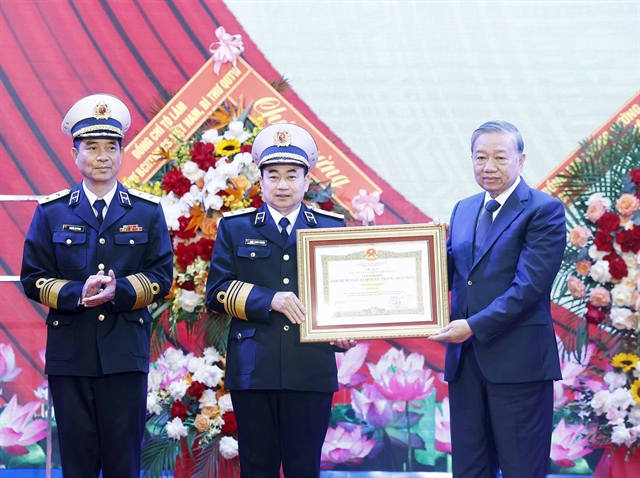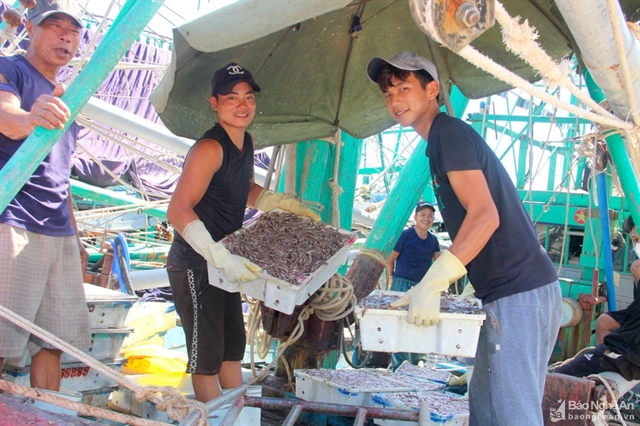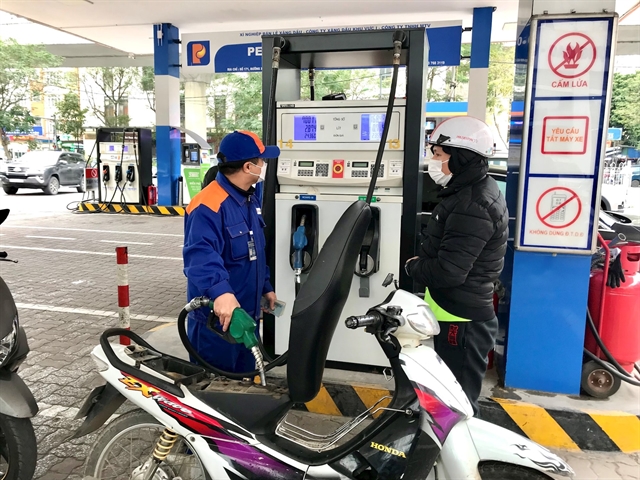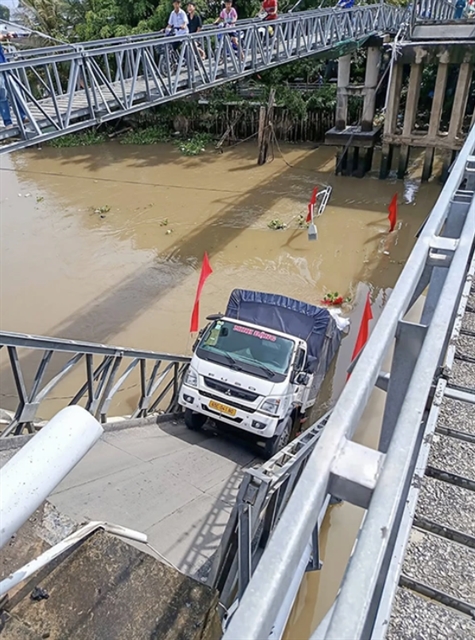 Society
Society


|
| Fishermen work on a fishing vessel in the central province of Nghệ An. — Photo baonghean.vn |
NGHỆ AN — Localities in the central province of Nghệ An have been facing a shortage of offshore fishermen as young workers are turning their interests into working abroad or other vocations.
Lê Bá Kiên, a marine fishing vessel owner in the province’s Quỳnh Lập Commune, said that his vessel required a crew of 12 workers for an off-shore fishing trip.
However, since the beginning of this year, he could employ only eight workers as many local workers prefer to work overseas or to switch to other occupations.
“Due to the lack of labour, each sea voyage does not operate at full capacity,” Kiên said.
For example, Kiên said his vessel used to catch 12 batches of fish per voyage but now it has been reduced to seven or eight batches, causing a decrease in productivity while oil consumption remained unchanged.
"Off-shore fishing requires workers who do not get seasick and must have fishing experience. So, it is not possible to use labourers who have never been to sea,” Kiên said, adding that vessel owners like him found it difficult to find labourers at this time.
Lê Bá Kỉ, Vice Chairman of Quỳnh Lập Commune People's Committee, said that the commune had the biggest number of fishing vessels in Nghệ An with 205 vessels.
With fishing experience, local fishermen used to earn solid incomes from working at sea, and the fishing industry also used to generate many jobs for local people.
In the last few years, young workers in the locality tended to go overseas to work, Kỉ said.
From the beginning of this year, 256 local workers went to work overseas and most of them were former marine workers on fishing vessels.
“At present, Quỳnh Lập Commune has a shortage of 200 to 300 fishermen,” Kỉ said.
Due to the impact of the COVID-19 pandemic and the hike in oil prices, fishermen had unstable incomes, Kỉ said.
"Although the current salary of a fisherman is VNĐ8-10 million per month on average, the labourers are still not interested,” Kỉ said, adding that their salary could be less for various reasons. "For example, if the weather is bad, they have to return midway, which takes many days off and lowers their income."
Due to a shortage of local marine workers, vessel owners have to hire labour from other localities, or reduce the number of workers on board to maintain operations. Large capacity ships, which used to have a crew of 13-15 people, now have reduced their crew to eight or nine people. Moreover, the crew has to work harder.
Hoàng Ngọc Thủy, Head of the Economic Department of Hoàng Mai Town, said that a shortage of marine workers had occurred in the coastal localities of Quỳnh Phương and Quỳnh Lập for months.
To solve the shortage, vessel owners had reduced labour for the immediate future and had considered installing a hydraulic winch system on fishing vessels to save labour, Thủy said.
However, because such a system requires an investment of VNĐ350-400 million, it’s difficult for fishing vessel owners to afford it.
Bùi Xuân Trúc, Deputy Director of Agriculture and Rural Development Department of Quỳnh Lưu District, said that the Provincial People's Council issued Resolution No. 18/2021/NQ-HDND to support agriculture, including supporting fishing vessel owners to install hydraulic winch systems. However, because of the costly installation, and the support reached only 30 per cent of the cost, fishermen were not very interested.
Chu Quốc Nam, Deputy Director of Nghệ An Fisheries Sub-Department, said that the shortage of fishermen affected the fishing industry of the locality.
Nghệ An Province now has more than 3,400 fishing vessels, of which 1,221 are off-shore fishing vessels. To ensure fishing activities for vessels, the province needs about 15,000 fishermen working directly at sea. Thousands of indirect workers onshore are also relying on the operation of such fishing vessels, according to Nam. — VNS




